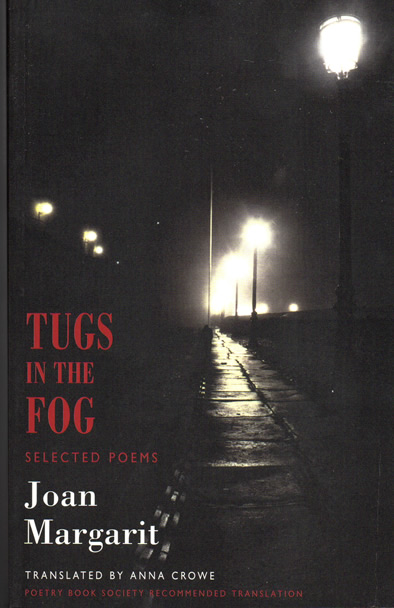Tugs in the fog

Shipwrecks
The damp and narrow street is almost blocked
by heaped belongings: rusting refrigerator,
two mattresses propped up against the wall,
a sofa and a standard-lamp, both broken.
All that is left, now, from an eviction.
They’re debris from the future.
They’re things you often find in streets like these,
but now he’s thinking they might be his own
remains, the things he’s seen.
He turns: a cat creeps underneath the sofa
and stares at him with green eyes just like hers.
Self Portrait
It was left over from the war, the old cloak
of a deserter on my bed(*). At night I felt
the rough touch of years that were not
the happiest of my life.
In spite of everything, the past ends up being
a brotherhood of wolves, melancholy
for a landscape skewed by time.
What remains is love—not philosophy,
which is like an opera—and, above all,
no trace of the damned poet: I am afraid,
but I get by without idealism.
Sometimes, tears slide down
behind the dark lenses of my glasses.
Life is the cloak of a deserter.
(*)At the end of the war, when times were hard, the warm cloaks worn by soldiers were used as extra bedding in most homes.
Morning in Montjuïc cementery
I have climbed the hill of the tombs.
I have reached this spot by crossing the waste ground
of Can Tunis, snowy with plastic bags
and syringes, where junkies wander
shakily about like statues made from rags.
They say the Council wants to bulldoze it,
concrete over these fields of weeds
in front of the huge wrought-iron gate
of the cemetery, that rises in front of the sea.
For the dead it will mean less congenial company:
the dead, their wall and their silence
accord well with the junkies wandering
about like lost soldiers after a defeat.
As I climb up the old path above the port
ships and cranes grow smaller
and the sea spreads itself out. Here,
right at the very top,
you are spared the grief of the world.
Inventory
A street-light has had its glass smashed
and is out. Its purpose
is not to shed light on the pavement,
but to be an iron post in the darkness.
In the street there is a burnt-out skip,
blackened, with its plastic damaged.
The thing itself, too, is
twisted and capsized, a piece of rubbish.
Our daughter is this anguish
at time passing, time freezing our life.
Now, her purpose is not to love
or be loved, but to be the dust
of grey, insensate material.
Everything loses its fragile purpose.
And look, love, I just don’t care
what name we end up giving all this,
because this is where our strength comes from.
This part of me that you know nothing about,
where I keep my cold, intemperate grief,
the part of me you dislike the most, is the part
that has been closest to you, the part of me that
has always, unconditionally, loved you most of all.
Feeble Brightness
The bubble of light within the tunnel
carries our faces away with it into the dark.
Although I recognize some trace
of that war-time child corrupted
by the gloomy myth of purity,
I look at myself in the glass of the metro carriage
with a mineral indifference,
because I already know that nothing inside me will change.
An old man’s love is as hard as the fig-tree
with its dusty, horribly contorted limbs, his heart
is dark and hidden, like the heart of the rose
among its crimson petals that are big but weak.
Cold passion is even more blind.
Sex puts up a fight in a hovel
with hardly any light, at the back of your mind.
Outside, death waits to come in.
Beginnings and endings
Once, I was a girl with a future.
I could read Horace and Virgil in Latin,
recite the whole of Keats by heart.
But when I entered the grown-ups’ caves,
they caught me and I started to bear
the children of a stupid, conceited man.
Now I drown my sorrows whenever I get the chance
and weep if I remember a line of Keats.
When you’re young, you don’t know
that you can’t stay in one place forever.
And you marvel if the man or woman
you longed to place your trust in never appears.
You don’t understand, when you’re young, that beginnings
have nothing to do with endings.
Three women
A photograph taken
three years after war had ended.
It’s the garden, in fact a neglected yard
that lay behind the house.
Not one of us there is smiling.
Fear steeps these garments, so often
torn and mended, as families are.
We’re looking straight at the camera: my mother
with the swept-up hair-do of a film about
occupied France.
My grandmother twists a handkerchief in her hands
for one of her sons, still in prison.
I hardly remember the other woman:
weakened with so much suffering, my aunt
died of a heart-attack a few months later.
Amidst the three of them, astride a bike,
four years old, grave-faced, I look like an adult.
How little there remains,
stored in memory’s poky little room,
overlooking the dry garden of an autumn
with ghosts of roses: the garden
of childhood, fear’s back-yard.